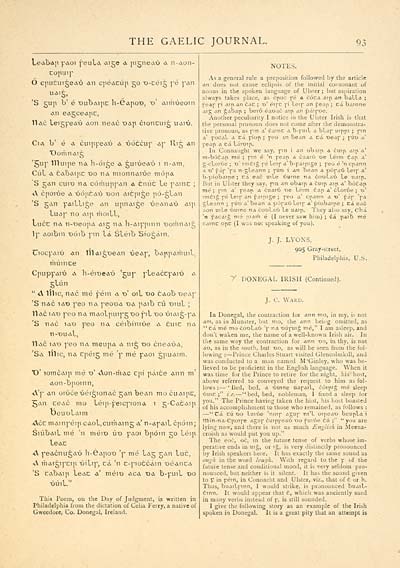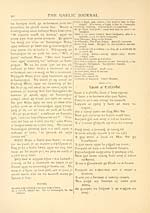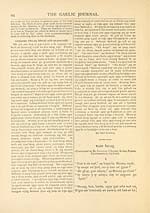Download files
Complete book:
Individual page:
Thumbnail gallery: Grid view | List view

THE GAELIC JOURNAL.
93
C0]\U1)'
O cnucinjeAU ah cnédciin j^o 'o-céi^ j-é \\\n
UA15,
'S gun b' é tiLibAinc li-éAi\0T), -o' Aitiitieoin
AH eAjceAjic,
IIac LeigpeAt) aoh iicac x>a\\ cioiicutj uaiu.
ClA b' é A CUl|\peA'Ó A ■ÓÜCCU]' A]- tllj At!
"OoiilllAl j
'gu]" 111ui]\e HA ti-ótj^e A juibeAÓ 1 n-Aiii,
CiiL A cAbAipc no iiA iiiionnAit)e tiiónA
S gAti cinü 11Ä cóiiuin]"An a cnúc le •[■Aiiic ;
<\ c]ioiT)e A •oópcAt) ■oon Aicnije ]\ó-jlAn
'S jAn yAilbije An iinnAije ■óeAiiAT!) ai]i
tuA]' no Ai]\ moilt,
Luce iiA ii-t)eonA A15 iiA li-Aipninn noiiinAij
1)' Aoibin ■oóib ]'in lÁ Sléib Si'ojÁin.
ülOCJ-'Alt) All lÌlAljüeAtl ■ÓeA]', bA|AHAIÌnill,
liiúnice
CnupfAi-ó A h-éixieAt) 'juf ]"leAcc|:Afó a
jUin
" -A III1C, tidc mé ỳé\n a v oiL vo cAob ve^y
'S iiAC lAt) ]-eo iiA ]-eoDA üA ]iAib cú üiuL ;
IIac lAü ]-eo riA mAoL]\ui]"5t)ofii ■00 ■óiai j-]"a
'S tiAc lAü ]'eo 11A céibíiii-óe a cuic iia
n-t)UAl,
tlAC 1AT) ]'eo iiA nieu]\A a 1115 tio ciieA-ÓA,
'Sa III1C, HA cnéij iiié Y nié pAOi jiiiiAiiii.
"O' lomcAin mé ■o' v\on-iÌK\c cpi ]iÁice Aiin m'
ẃon-b]ioinii,
vV'i" All onäceẃéijionAc jAn beAn niocuAi]ic,
5^11 ceAC 1110 iéip-ŷeici'ionA 1 j-Cacai]!
DeuutAiiii
ŵcciiiAin)'éi]i cAoliCuiiiAing a' n-A]'Ail c|ióiii;
SiúbAiL iiié '11 niéiD úv (.-aoi bnóin 50 Léin
beAC
-d i'eAcinigA-ó 1i-èA|ioT) ']■ tiié Iaj jah luc,
v\ tilAljllXlH ■Óíll]', CÁ '11 C-l"10CCÁin üéAllCA
'S CAbAi]! leAC a' niéit) aca da b-jruil t)0
■óúiL"
This Poem, on the Day of Judgment, is written in
Philadelphia from the dictation of Celia Ferry, a native of
Gweedore, Co. Donegal, Ireland.
NOTES.
Ai a general rule a prepoiition followed by the article
Ati does not cause eclipsis of the initial consonant of
nouns in the spoken language of Ulster; but aspiration
always takes place, as cpoc ]-é & coca &\]\ «in bûLLíi ;
fe<i]- p Alp An CAC ; ■o' éifc p Lei)" An ýeAp ; cÁ bAUine
A15 An JAbAp ; beiẃ eAOAC Aip An pÁi]-oe.
Another peculiarity I notice in the Ulster Irish is that
tlie personal protioun does not come after the demonstra-
tive pronoun, as fin a' CAinc a b-puil a blA)' uippi ; fin
a' fOCAÌ A CÁ flop ; feo in beAn a CÁ ■oeiy ; f ÚD a'
peAp A CÁ iÁTOip.
In Connaught we say, pin i ah objip a cuip Aip a'
ni-bóCAp me ; pin é 'n peA^x a cuaitj 'oe Léini CAp a'
j-cloi-óe ; o' imcij pé Leip a' b-pAtiMge ; peo é 'n cpAnn
a x>' pÁp 'pA n-jLeAnn ; ptit) i An beAn a popAO Leip a'
b-píobÄipe ; üá eAc uibe t)uine riA couLao Ve iiAip.
But in Ulster they say, pn An obiip A cuip Aip a' bócAp
me; pin a' peAp a cuai-d ne lenn ca]\ a' cLoióe ; -o'
imcig pé beip An pAipige ; peo a' cpAnn a x>' pÁp 'y.y
gbeinn ; put) a' beAn a pói-A-òleip a' piobAipe ; CÁ eAC
Aon uiie xpuine nA co-oÌA-ô le UAip. Tliey also say, ChÁ
"n PACA15 nié (MAiTi é (I never saw him) ; CÁ paib me
cAinc ope (I was not speaking of you).
J. J. LYONS,
905 Gray-street,
Philadelphia, U.S.
DONEGAL IRISH (Continued).
J. C. Ward.
In Donegal, the contraction for Ann mo, in my, is not
Am, as in Munster, but mo, the Ann being omitted, as
" CÁ me mo cooLao 'p iiA ■oúpui^ nié," I am asleep, and
dun't waken me, the name of a well-known Irish air. In
the same way the contraction for Ann tio, in thy, is not
AT), as in the south, but t)o, as will be seen from the fol-
lowing : — Prince Charles Stuart visited GlencolmkiU, and
was conducted to a man named M'Ginley, who was be-
lieved to be proficient in the English language. When it
was time fur the Prince to retire for the night, his host,
above referred to conveyed the request to him as fol-
lows : — ' Ued, bed, a ■ouine tiApAit, cúipig nié sleep
■ôutc ;" /.if. — *'bed, bed, nobleman, I fixed a sleep for
you." The Prince having taken the hint, his host boasted
of his accomplishment to those who remained, as follows :
— " CÁ CÚ no Unoe 'noip Agup ni'L oipeAw beuplA i
t1lin-nA-Cpoipe Agup cuippeAb x>o pui-óe tv ;" " you are
lying now, and there is not as much English in Äleena-
croish as would put you up."
The eoc, oc, in the future tense of verbs whose im-
perative ends in uig, or 15, is very distinctly pronounced
by Irish speakers here. It has exactly the same sound as
oiigh in the word lough. With regard to the p of the
future tense and conditional mood, it is very seldom pro-
nounced, but neither is it silent. It has the sound given
to p in péin, in Connacht and Ulster, viz., that of c or h.
Thus, buAiLpinn, I would strike, is pronounced buAiL-
cinn. It would appear that c, whicli was anciently used
in many verbs instead of p, is still sounded.
I give the following story as an example of the Irish
spoken in Donegal. It is a great pity that an attempt is
93
C0]\U1)'
O cnucinjeAU ah cnédciin j^o 'o-céi^ j-é \\\n
UA15,
'S gun b' é tiLibAinc li-éAi\0T), -o' Aitiitieoin
AH eAjceAjic,
IIac LeigpeAt) aoh iicac x>a\\ cioiicutj uaiu.
ClA b' é A CUl|\peA'Ó A ■ÓÜCCU]' A]- tllj At!
"OoiilllAl j
'gu]" 111ui]\e HA ti-ótj^e A juibeAÓ 1 n-Aiii,
CiiL A cAbAipc no iiA iiiionnAit)e tiiónA
S gAti cinü 11Ä cóiiuin]"An a cnúc le •[■Aiiic ;
<\ c]ioiT)e A •oópcAt) ■oon Aicnije ]\ó-jlAn
'S jAn yAilbije An iinnAije ■óeAiiAT!) ai]i
tuA]' no Ai]\ moilt,
Luce iiA ii-t)eonA A15 iiA li-Aipninn noiiinAij
1)' Aoibin ■oóib ]'in lÁ Sléib Si'ojÁin.
ülOCJ-'Alt) All lÌlAljüeAtl ■ÓeA]', bA|AHAIÌnill,
liiúnice
CnupfAi-ó A h-éixieAt) 'juf ]"leAcc|:Afó a
jUin
" -A III1C, tidc mé ỳé\n a v oiL vo cAob ve^y
'S iiAC lAt) ]-eo iiA ]-eoDA üA ]iAib cú üiuL ;
IIac lAü ]-eo riA mAoL]\ui]"5t)ofii ■00 ■óiai j-]"a
'S tiAc lAü ]'eo 11A céibíiii-óe a cuic iia
n-t)UAl,
tlAC 1AT) ]'eo iiA nieu]\A a 1115 tio ciieA-ÓA,
'Sa III1C, HA cnéij iiié Y nié pAOi jiiiiAiiii.
"O' lomcAin mé ■o' v\on-iÌK\c cpi ]iÁice Aiin m'
ẃon-b]ioinii,
vV'i" All onäceẃéijionAc jAn beAn niocuAi]ic,
5^11 ceAC 1110 iéip-ŷeici'ionA 1 j-Cacai]!
DeuutAiiii
ŵcciiiAin)'éi]i cAoliCuiiiAing a' n-A]'Ail c|ióiii;
SiúbAiL iiié '11 niéiD úv (.-aoi bnóin 50 Léin
beAC
-d i'eAcinigA-ó 1i-èA|ioT) ']■ tiié Iaj jah luc,
v\ tilAljllXlH ■Óíll]', CÁ '11 C-l"10CCÁin üéAllCA
'S CAbAi]! leAC a' niéit) aca da b-jruil t)0
■óúiL"
This Poem, on the Day of Judgment, is written in
Philadelphia from the dictation of Celia Ferry, a native of
Gweedore, Co. Donegal, Ireland.
NOTES.
Ai a general rule a prepoiition followed by the article
Ati does not cause eclipsis of the initial consonant of
nouns in the spoken language of Ulster; but aspiration
always takes place, as cpoc ]-é & coca &\]\ «in bûLLíi ;
fe<i]- p Alp An CAC ; ■o' éifc p Lei)" An ýeAp ; cÁ bAUine
A15 An JAbAp ; beiẃ eAOAC Aip An pÁi]-oe.
Another peculiarity I notice in the Ulster Irish is that
tlie personal protioun does not come after the demonstra-
tive pronoun, as fin a' CAinc a b-puil a blA)' uippi ; fin
a' fOCAÌ A CÁ flop ; feo in beAn a CÁ ■oeiy ; f ÚD a'
peAp A CÁ iÁTOip.
In Connaught we say, pin i ah objip a cuip Aip a'
ni-bóCAp me ; pin é 'n peA^x a cuaitj 'oe Léini CAp a'
j-cloi-óe ; o' imcij pé Leip a' b-pAtiMge ; peo é 'n cpAnn
a x>' pÁp 'pA n-jLeAnn ; ptit) i An beAn a popAO Leip a'
b-píobÄipe ; üá eAc uibe t)uine riA couLao Ve iiAip.
But in Ulster they say, pn An obiip A cuip Aip a' bócAp
me; pin a' peAp a cuai-d ne lenn ca]\ a' cLoióe ; -o'
imcig pé beip An pAipige ; peo a' cpAnn a x>' pÁp 'y.y
gbeinn ; put) a' beAn a pói-A-òleip a' piobAipe ; CÁ eAC
Aon uiie xpuine nA co-oÌA-ô le UAip. Tliey also say, ChÁ
"n PACA15 nié (MAiTi é (I never saw him) ; CÁ paib me
cAinc ope (I was not speaking of you).
J. J. LYONS,
905 Gray-street,
Philadelphia, U.S.
DONEGAL IRISH (Continued).
J. C. Ward.
In Donegal, the contraction for Ann mo, in my, is not
Am, as in Munster, but mo, the Ann being omitted, as
" CÁ me mo cooLao 'p iiA ■oúpui^ nié," I am asleep, and
dun't waken me, the name of a well-known Irish air. In
the same way the contraction for Ann tio, in thy, is not
AT), as in the south, but t)o, as will be seen from the fol-
lowing : — Prince Charles Stuart visited GlencolmkiU, and
was conducted to a man named M'Ginley, who was be-
lieved to be proficient in the English language. When it
was time fur the Prince to retire for the night, his host,
above referred to conveyed the request to him as fol-
lows : — ' Ued, bed, a ■ouine tiApAit, cúipig nié sleep
■ôutc ;" /.if. — *'bed, bed, nobleman, I fixed a sleep for
you." The Prince having taken the hint, his host boasted
of his accomplishment to those who remained, as follows :
— " CÁ CÚ no Unoe 'noip Agup ni'L oipeAw beuplA i
t1lin-nA-Cpoipe Agup cuippeAb x>o pui-óe tv ;" " you are
lying now, and there is not as much English in Äleena-
croish as would put you up."
The eoc, oc, in the future tense of verbs whose im-
perative ends in uig, or 15, is very distinctly pronounced
by Irish speakers here. It has exactly the same sound as
oiigh in the word lough. With regard to the p of the
future tense and conditional mood, it is very seldom pro-
nounced, but neither is it silent. It has the sound given
to p in péin, in Connacht and Ulster, viz., that of c or h.
Thus, buAiLpinn, I would strike, is pronounced buAiL-
cinn. It would appear that c, whicli was anciently used
in many verbs instead of p, is still sounded.
I give the following story as an example of the Irish
spoken in Donegal. It is a great pity that an attempt is
Set display mode to: Large image | Transcription
Images and transcriptions on this page, including medium image downloads, may be used under the Creative Commons Attribution 4.0 International Licence unless otherwise stated. ![]()
| Early Gaelic Book Collections > Blair Collection > Gaelic journal > Volume 4, number 33 > (93) |
|---|
| Permanent URL | https://digital.nls.uk/79325615 |
|---|
| Description | No. 33, Vol. IV. 1889. |
|---|---|
| Shelfmark | Blair.217 |
| Attribution and copyright: |
|
| Description | A selection of books from a collection of more than 500 titles, mostly on religious and literary topics. Also includes some material dealing with other Celtic languages and societies. Collection created towards the end of the 19th century by Lady Evelyn Stewart Murray. |
|---|
| Description | Selected items from five 'Special and Named Printed Collections'. Includes books in Gaelic and other Celtic languages, works about the Gaels, their languages, literature, culture and history. |
|---|

